Back in 2012, thanks to the growing success of Farrington’s Mellow Yellow we started using rapeseed from a second farm, working with our neighbours, in addition to the seed we grow on our own farm. See my blog; “Mellow Yellow Popularity Grows” April 10, 2012. Now, we have added a third farmer to the list.
The Bletsoe and Farrington families have been neighbouring farmers since at least my great grandfather’s day. Like most farming neighbours, we have developed strong friendships over those generations, built on trust and the odd bit of occasional light hearted banter.
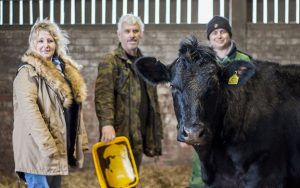
Emma Bletsoe has, for several years, used our rapemeal, produced as the by-product from pressing the oil out of the seed, to feed her cattle. Then a couple of years ago, Emma and I were chatting at a local gathering, when the conversation moved on to her rapeseed crop and my future needs for more LEAF Marque rapeseed. Emma thought that as well as buying the meal off us, perhaps she could also sell us her seed in the first place. Emma and her guys on the farm, Garry and Stuart, have worked hard to meet the rigorous LEAF Marque standards, which they passed with flying colours.
Now we purchase seed from Emma, which ensures I have a fully traceable, accredited supplier; while Emma gets a little bonus and the odd bottle of oil for the extra work required. Then once we have pressed the seed to produce our Mellow Yellow, Gary or Sturt arrive with their tractor and trailer to collect the rapemeal, which they use to make a healthy and, again fully traceable, meal for their cattle. This is something the cows particularly like in the cold winter months when they are kept in warm straw-bedded barns, as opposed to eating fresh grass in the fields during the summer.
This is a prime example of neighbouring farmers working well together, making happy farmers, happy cows and most importantly, the best quality, delicious Farrington’s Mellow Yellow that you can trust every time.
Whilst not a dairy farmer I have plenty of friends around the country who are; sadly the numbers are decreasing, at around 10 leaving the industry every week. The UK currently has around 14,000 dairy farmers producing 80% of Britain’s milk and dairy products.
As with decreasing oil prices, one can’t help but notice milk prices are also in free fall on supermarket shelves; at around 43p per litre it is cheaper than bottled water and less than half the price of cola. The unsustainable prices are hitting the headlines with all sorts of people being blamed, not least the supermarkets for forcing farmers out of business. However, while I have genuine sympathy for farmers having to sell their milk for less than the cost of production, it is too simplistic just to blame supermarket price wars.
As with many industries in a free market, global society, the trend of less UK dairy farmers will continue, whilst the size of those remaining will increase. Where a few years ago the average dairy herd was around 80 cows, they are now two or three times that size, becoming more efficient and producing more milk. Long term there is a huge growing demand for milk and dairy products globally, however at the moment this has dropped off. The slowing Chinese economy means they are consuming less milk, including British produced milk powder; the situation being so bad that Chinese dairy farmers are pouring milk down the drains and culling cattle. Secondly due to economic sanctions against Russia, the Russians are currently not buying any French cheeses.
Additionally, because of warm wet weather in the UK and Ireland over the last few months, grass has grown well and the cows have produced plenty of milk, all at a time when there simply isn’t the demand. Basically the situation for dairy farmers around the world is going to get worse before it improves.
Everyone from farmers, processors, retailers and politicians are trying to workout a way forward. Unlike the price of oil going down (and let’s face it, I like paying £10 less every time I fill the car up), in an industry controlled by multinational companies who can manipulate the price and politics. Dairy farmers are small businesses, at the mercy of the market and therefore a balance has to be struck between nurturing an efficient British dairy sector, whilst ensuring the industry doesn’t disappear completely, which would be catastrophic on all levels, especially when demand for milk increases if we can’t produce it here in our own country.
We should relish quality milk produced in Britain. Milk is packed full of goodness with dozens of proteins; vitamins; minerals; carbohydrates and healthy fats. Full fat milk (3.5%) has less than a third of the fat content of a ‘low fat’ chicken diner (11%). Also at less than half the price of cola and full of calcium rather than sugar, it is better for your teeth too. Go and buy an extra pint today, great value for a fantastic product!

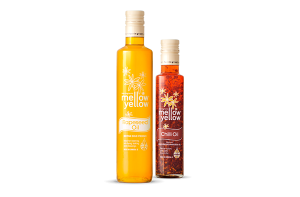 Oils
Oils Rapeseed Oil
Rapeseed Oil Chili Oil
Chili Oil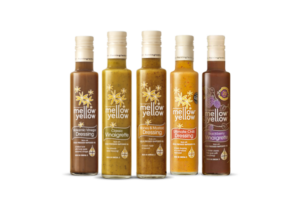 Dressings
Dressings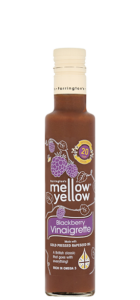 Blackberry Vinaigrette
Blackberry Vinaigrette Classic Vinaigrette
Classic Vinaigrette Balsamic Dressing
Balsamic Dressing Honey & Mustard
Honey & Mustard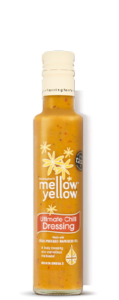 Ultimate Chilli Dressing
Ultimate Chilli Dressing